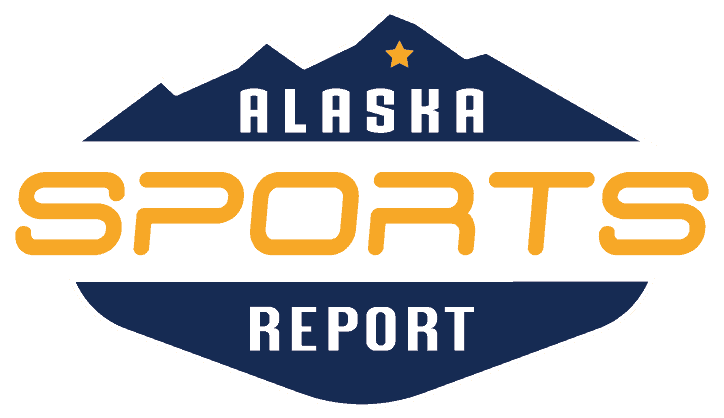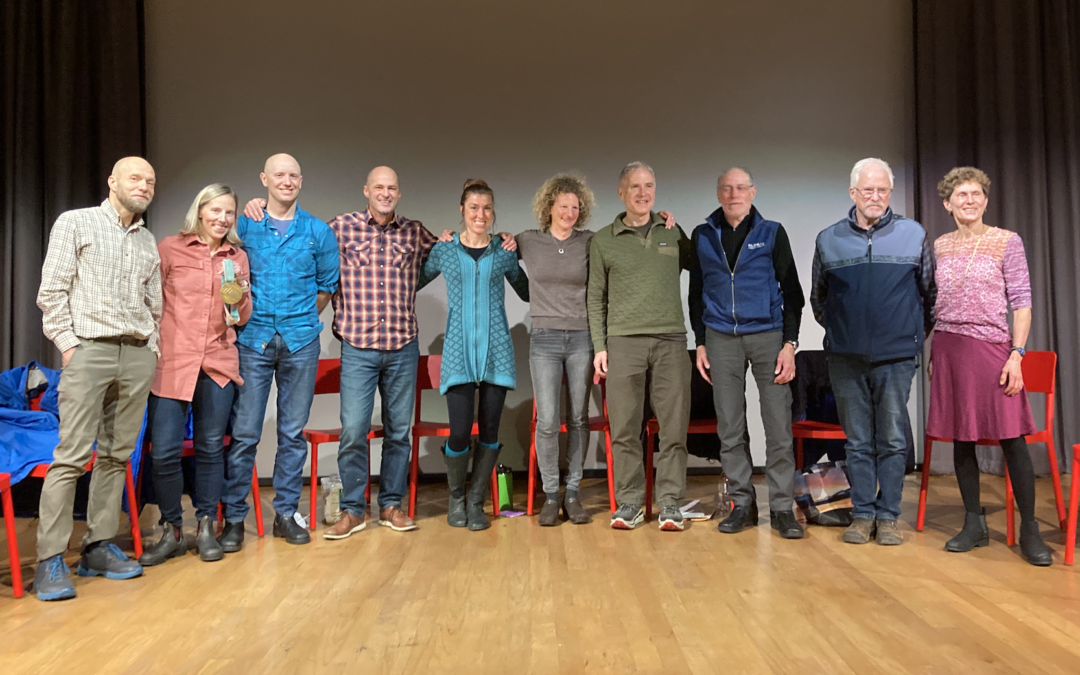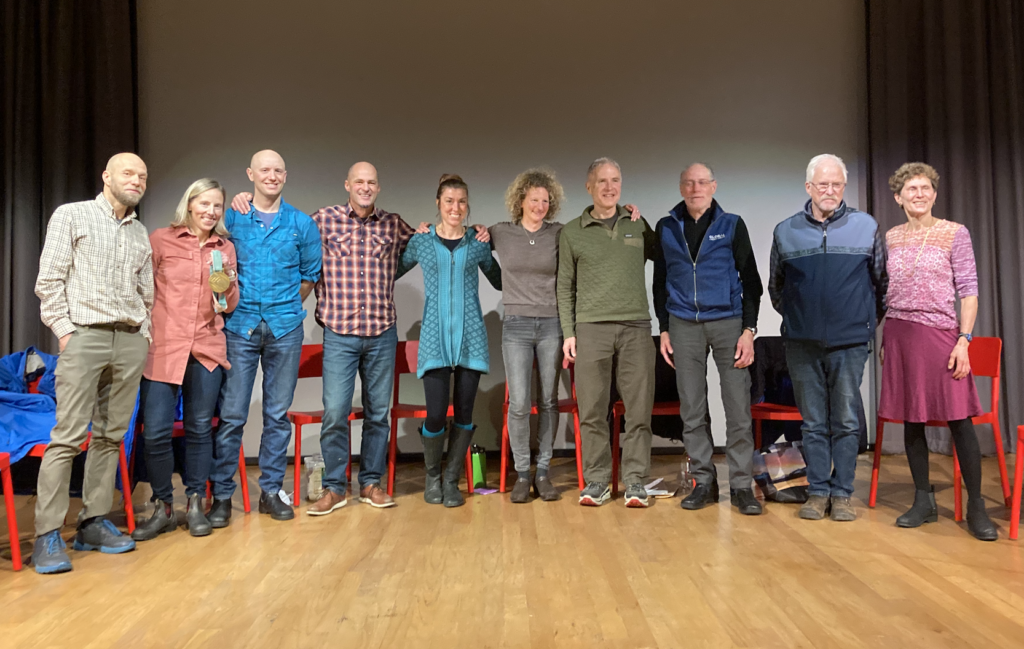
From Left to Right: Matias Saari (emcee), Kikkan Randall, Clint Helander, Harlow Robinson (emcee), Christy Marvin, Robin Beebee, Barney Griffith, Don Clary, Jeff King, Nancy Pease. Photo by Steve Cleary.
An all-star lineup of Alaska athletes and adventurers shared some of their stories last week at the Anchorage Museum, wowing a sold-out crowd for the December installment of Trail Tales with cliffhangers, crevasse-hangers and paddle-hangers.
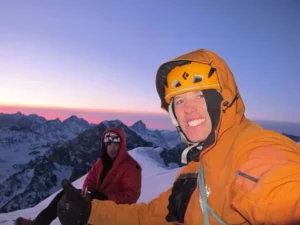
Clint Helander (foreground). Photo by Clint Helander.
Clint Helander of Anchorage, a climber who relishes icy ascents, told about the time he fell 25 feet into a crevasse while attempting to pioneer a new route on 14,500-foot Mount Hunter in the Alaska Range. Grim thoughts filled his head as he fell — “I’m going to break my legs. I’m going to get wedged in here. I’m going to break my back. I’m going to pull (climbing partner August Franzen) in and we’re both going to die” — before Franzen arrested the fall.
Helander hung upside-down in the crevasse, dangling from the rope. Once he righted himself, he did what he said any Millennial would do. “I took out my phone and took a selfie, because I’m only going to be there once, right?” he said.
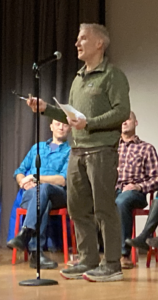
Barney Griffith speaks at Trail Tails. Photo by Steve Cleary.
Barney Griffith of Anchorage, a noted mountain runner and river runner, talked about his harrowing, pioneering descent in 1976 of Devil’s Canyon on the Susitna River, a fearsome rapid that’s been called the Mount Everest of kayaking.
Griffith recalled how as an 18-year-old in 1976 he coerced his way into a party of four expert kayakers in Alaska to attempt the first known descent of the rapids for a segment of ABC TV’s “The American Sportsman.” Griffith was the last to make a run, and as cameras rolled from a helicopter above, he was upended and nearly swallowed by the raging river.
Somehow he hung onto his paddle and stayed with his boat to become one of two men who made successful descents. One of the others needed a helicopter rescue, and two had to swim.
Jeff King of Denali Park, a four-time Iditarod champion, shared a stirring tale of running the 1989 Yukon Quest in record cold. He left the halfway point at Dawson City on a moonless night to begin a long run on the frozen Yukon River. He fell asleep on his sled runners while the dogs kept moving, and when he woke up, he was on a narrow trail surrounded by open water.
Then he was neck-deep in the water. King described how he pulled each dog out of the water and commanded them to pull. As the sled “inched its way out of its frozen tomb,” King stopped worrying about drowning and began worrying about freezing to death.
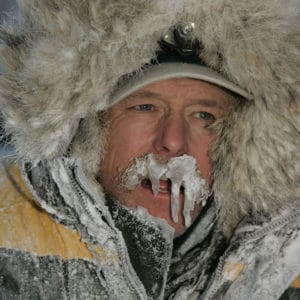
Jeff King
Robert Service’s words about ill-fated Sam McGee filled his mind.
“If you want to know if I lived,” King concluded, “you gotta buy the book.”
King, Griffith and Helander were among eight speakers who took to the stage for a grand night of theater. Trail Tales, a storytelling series put on by the nonprofit Alaska Trails group, features adventurers and athletes who share seven-minute stories about their trail experiences or adventures.
Proceeds from the $20 tickets help support Alaska Trails, which started Trail Tales in 2017. The series continues on Jan. 23 (learn more at alaska-trails.org).
A partner group is chosen for each installment and also gets a share of the proceeds. This month’s partner was Healthy Futures, a program overseen by the Alaska Sports Hall of Fame. As it turned out, four of the evening’s eight speakers are Hall of Fame members — King, Olympic ski champion Kikkan Randall, track star Don Clary and record-setting mountain runner Nancy Pease.
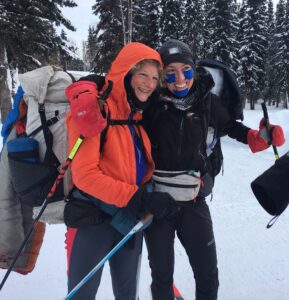
Robin Beebee and Christy Marvin at the ITI finish (Photo by Matias Saari)
Other speakers were Christy Marvin of Palmer and Robin Beebee of Anchorage, who teamed up for a tour de force performance while describing how they broke the women’s ski record in the the 300-mile Iditarod Trail Invitational last winter.
Theirs was an amazing story of survival and camaraderie, told with props, sound effects, choreography and more than a few comedic touches.
Beebee stomped on the wooden stage floor to mimic the sound of fellow racers coming and going, loudly, to checkpoints while the two women tried desperately to sleep. Beebee called the race “the Napquest 300.”
On four straight nights, disruptions at checkpoints forced them back outdoors, devoid of sleep. Marvin turned a leaky water bottle upside-down to show how water got into Beebee’s boots the night the two shared a sleeping bag while camping out in minus-40 temperatures while 70 miles from shelter.
On their seventh day, Marvin — a champion of numerous grueling mountain races — didn’t think she could keep going. She urged Beebee to go ahead without her and send back a snowmachine once she reached the finish line in McGrath.
“Leave me and go get the record,” she said.
“Record? What record? We’ve been out here a week,” Beebee said.
Beebee refused to go without Marvin, so they plodded ahead together. Then Beebee’s GPS showed they were closing in on McGrath and the knowledge spurred them to move faster. “What was that record again?” they wondered.
“We got to the finish line with 40 minutes to spare,” Beebee said.
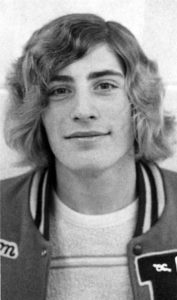
Don Clary as an East High student
Like some of the others, their tale went over the seven-minute barrier, but it was worth it.
Don Clary — Alaska’s first Olympian in track and field, who made it to the 10,000-meter semifinals at the 1984 Summer Olympics — showed he still has speed. He broke the seven-minute barrier while still making an impact with his story of growing up in Anchorage in the 1960s and 1970s.
“No bike paths, no Dome. You really had to be creative about training,” he said.
At that point he reached into a shopping bag and pulled out a pair of grubby old hiking boots.
“These were my first training shoes,” he said. “I had a paper route for four years … and I started jogging my paper route in these shoes.” During the winter, he said, he ran in the hallways at East High, “five laps to a mile, 10 miles a day.”
“I adapted,” he said.
Nancy Pease, the Anchorage woman who set records that lasted decades at Mount Marathon and Crow Pass, adapted to something quite different the time she went on a hiking trip to Morocco and wound up racing 10 miles uphill against a mule.
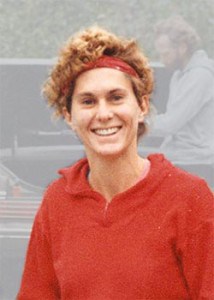
Nancy Pease
Her group’s Moroccan guide knew Pease wanted to move at a faster pace than what he was setting, so one night at a guesthouse he told Pease that she could move as fast as she wanted the next morning on a hike to an alpine lake. A mule and rider were going up first to set up a picnic lunch, and Pease could run behind them, but if she fell too far back she must stop and wait for the others.
“All of the guesthouse guys are betting on the mule,” she was told. They didn’t think Pease, a woman, could keep up.
“How fast does a mule run anyway?” she thought.
It was an event-filled excursion that felt like a high-stakes race, complete with misdirection by the rider and noxious clouds of dust kicked up by the mule. Pease knew there was steeper terrain as they neared the lake, and that’s when she made her move, speed-hiking past the mule for the most unusual triumph of her career.
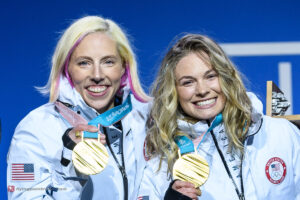
Kikkan Randall and Jessie Diggins after winning gold in 2018
The last to speak was Kikkan Randall. She talked about how an injury nearly cost her a spot in on the U.S. entry for the team sprint race at the 2018 Winter Olympics, and how teammate Sadie Bjornsen — also a leading candidate for that spot— offered instant support when coaches announced they had chosen Randall.
“I believe in you as much as I believe in myself; what can I do to help?” Randall recalled Bjornsen telling her.
“It was the most amazing gift, because it made me believe too, and I also got to come back to Alaska and celebrate this,” she continued, pulling from her pocket the gold medal she won in the race.
An absolute pro whether on skis or a microphone, Randall went on to pay tribute to the late Bonny Sosa, who started the Healthy Futures program to encourage kids to be active. She spoke about community — “It was growing up here that got me to the start line,” she said — and how it shapes people like those she shared the stage with, providing a fitting finale for a night she called “an incredible celebration of these heroes.”
